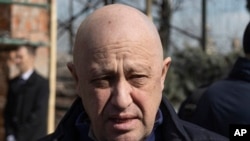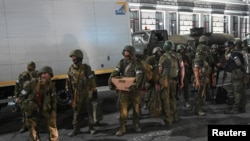Yevgeny Prigozhin, the leader of Russia’s Wagner mercenary group, has arrived in Belarus after staging a short-lived, aborted mutiny last weekend against Russian President Vladimir Putin’s leadership over the fight against Ukraine, Belarusian leader Alexander Lukashenko said Tuesday.
It was not immediately clear where Prigozhin was in Belarus, how many fighters had accompanied him or how long he planned to stay there. Lukashenko, an ally of Putin, last Saturday negotiated Prigozhin’s departure for Belarus after Prigozhin led thousands of his fighters out of Ukraine on a caravan toward Moscow before calling off the advance well short of confronting Russian soldiers on the outskirts of the capital city.
Putin has promised Prigozhin’s safety in Belarus, and according to Belarusian state media, the authoritarian Lukashenko has urged Putin to not kill Prigozhin.
"I said to Putin: we could waste [Prigozhin], no problem. If not on the first try, then on the second. I told him: don't do this," Lukashenko said during a meeting with security officials, according to state media.
Western countries have sanctioned the 68-year-old Lukashenko for cracking down on opposition figures and allowing Russia to attack Ukraine last year from Belarusian territory, while more recently allowing Russia to store tactical nuclear weapons in Belarus for possible use in the conflict in Ukraine.
While pledging that Prigozhin would be safe in Belarus, Putin has expressed mixed views about the Wagner Group since the rebellion against his authority and the leadership of the Russian defense ministry. Putin has characterized Wagner’s leaders as traitors but said the rank-and-file mercenaries “really showed courage and heroism" in their fighting against Kyiv’s forces.
Prigozhin’s arrival in Belarus came as Putin said Tuesday that Moscow had paid $1 billion between May 2022 and May 2023 to fully fund the Wagner mercenary fighters, contrary to claims by Prigozhin that he had financed his mercenaries.
"The content of the entire Wagner Group was fully provided by the state, from the Ministry of Defense, from the state budget. We fully funded this group," Putin told defense officials in televised remarks. Russia once denied the existence of the Wagner Group, but it has defended Russia’s interests in several African and Middle Eastern countries.
Many of the Wagner fighters in Ukraine were convicted criminals freed from Russian prisons on the promise that if they fought in neighboring Ukraine for six months, the remaining portions of their sentences would be rescinded.
As it has turned out, however, many of the Wagner recruits were poorly trained, ill-equipped for warfare on the front lines in Ukraine and quickly killed.
In addition to Russia paying salaries and incentive awards to the Wagner troops, Putin said Prigozhin’s food and catering business was paid nearly another billion dollars to feed Russian troops.
"I do hope that, as part of this work, no one stole anything, or, let's say, stole less, but we will, of course, investigate all of this,” Putin said of the state’s funding of Wagner and Prigozhin’s catering company.
Prigozhin said earlier this year that he had always financed Wagner but had looked for additional funding after Putin launched his invasion of Ukraine 16 months ago.
Prigozhin said Monday that his troops’ advance on Moscow had not been an attempt to overthrow the Russian government and that he remained a patriot. Prigozhin for weeks has complained that Russian defense officials have not provided them enough ammunition.
Putin has assailed the Wagner advance on Moscow as an armed rebellion and ordered that Wagner lose its heavy weaponry, while its fighters either join the regular armed forces or accept exile in Belarus.
Russia’s Federal Security Service announced Tuesday it was closing an investigation into the armed mutiny.
In a statement carried by Russian news agencies, the FSB said those involved “ceased activities directed at committing the crime.” Not prosecuting the fighters was part of an agreement late Saturday that brought the mutiny to an end.
Russia’s defense ministry also said Tuesday that the Wagner group was preparing to transfer heavy military equipment to the Russian military.
The U.S. intelligence community "was aware" that the mutiny orchestrated by Prigozhin "was a possibility" and briefed the U.S. Congress "accordingly" before it began, said a source familiar with the issue, who spoke on the condition of anonymity.
Earlier, U.S. President Joe Biden said, "We made clear we were not involved; we had nothing to do with this." Biden's message that the West was not involved was sent directly to the Russians through various diplomatic channels, White House national security spokesperson John Kirby told reporters. He did not characterize Russia's response.
Some information for this story came from The Associated Press, Agence France-Presse and Reuters.








